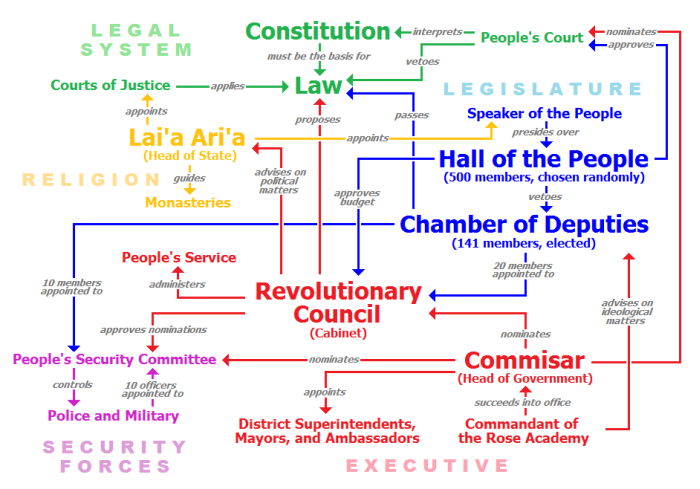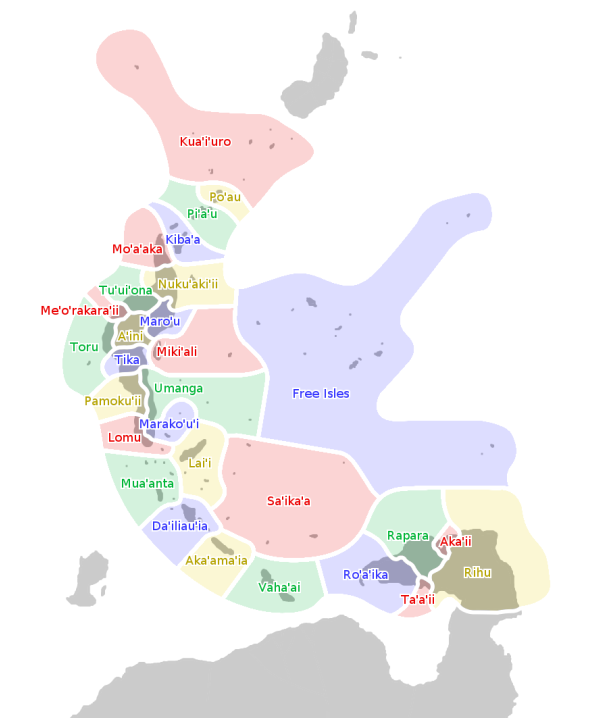Office
of External Information
.
GOVERNMENT OF MARI'IM
GUIDING CONCEPTS
Mari'im politics is based around a set of fundamental concepts known as ki'ali. These concepts are distilled forms of the traditions which have guided the Mari'im people for centuries, and as such, are held in very deep regard by the Mari'im political system. The structure of Mari'im government is designed in such a way as to protect and promote ki'ali, with the result that our system is quite unlike those found elsewhere. This is only natural - after all, each country possesses a distinct character of its own, and systems of government must be carefully tailored to fit that character. The Mari'im system of government follows the natural flow of Mari'im society, and contains nothing not born of the Mari'im way of life.
There are three primary components of ki'ali - environmentalism, religion, and socialiism. The first component, environmentalism, has always been a part of Mari'im life - living on islands with limited resources, the people of Mari'im have always needed to be mindful of their natural surroundings. Depletion of fish stocks, clearing of forests, and overuse of fresh water can leave a formerly plentiful island uninhabitable. The second component, religion, is also deeply rooted in tradition, enough so that there is no record of what Mari'im believed before the religion's birth. (For more information, see the Religion section of this guide). The third and final component, socialism, is also a reflection of traditional village life - communal ownership of property, especially land, was a necessity for survival, and while modern thinkers have refined the theories of communism to a much greater degree, they nevertheless echo the simple traditions followed in Mari'im for time immemorial.
| COMMENTARY: All the above is only true from a certain way of looking at things. Most people would probably take different interpretations, particularly with regards to the Mari'im government's claim that socialism is a deep-rooted Mari'im tradition. Basically, the philosophy of ki'ali is an invention of the clique which established modern Mari'im, who needed a way to blend their communist doctrines with Mari'im tradition in order to make it more acceptable to the country's uneducated farmers and fishermen (who have never been very impressed by complicated political philosophy, and who would have rejected orthodox communism as an alien and overly intellectual). |
GOVERNMENTAL STRUCTURE
The diagram below provides a simplified model of how the various components of the Maro'im government work together. There are five basic branches of government - the legislature, the executive, the legal system, the religious authorities, and the security forces. Each is represented in a different colour.

Legislature
The legislature of Mari'im is bicameral, consisting of the Hall of the People (the upper house) and the Chamber of Deputies (the lower house). The Chamber of Deputies is the primary body, and consists of 141 directly elected representatives of the Mari'im people. The Hall of the People, which meets less frequently, consists of 500 people randomly selected from the Mari'im population (in roughly the same manner that some countries select jury members). The random nature of service in the Hall is designed to ensure input by people who are not professional politicians - the Hall effectively serves as a way to give ordinary citizens a means of control over the political establishment.
The legislature has a number of powers. Most importantly, the Chamber of Deputies has the ability to pass new laws. In addition, all members of the Revolutionary Council (see below) must be members of the Chamber, as must half the members of the People's Security Committee (also see below). The Hall of the People. meanwhile, can veto the decisions of the Chamber, and is also responsible for approving the national budget and for confirming judges of the People's Court (see below).
| COMMENTARY: The Mari'im legislature is very weak. Firstly, anyone who the police deem to be "not of good character" is ineligible to become a member of either house, weeding out all the dissidents immediately. Secondly, debate and discussion is tightly controlled, with little opportunity for real expression of views. Both chambers (especially the upper) meet very infrequently, but are given a large workload - this means their decisions are usually rushed. Thirdly, legislators have no real source of information and advice other than the state-controlled media and "helpful" advisors from the Rose Academy (the regime's ideological heart). In short: the legislature is designed in such a way that most of its members hear no alternative views and have little inclination or opportunity to form their own, meaning that they tend to vote whichever way the government gently pushes them. |
As in most democracies, a number of political parties exist in Mari'im. The oldest surviving party is the Revolutionary Communist-Environmentalist People's Democratic Party (RCEPDP), which led the country to independence. Others include the Democratic Progressive Party (DPP), the Populist Party (PP), the Revolutionary Green Party (RGP), the Free Isles United Party (FIUP), and the People's Theocratic Party (PTP), all of which are represented in the Chamber of Deputies.
| COMMENTARY: The RCEPDP was the movement which successfully established itself as the founders of Mari'im when Lendia (the colonial power) pulled out. Today, however, the party is not particularly important - all important figures in the regime are members of it, but its office-holders have little real power. Its primary function is as a vehicle to mobilise popular support - as such, it is a tool of the regime, not the actual centre. The other political parties, meanwhile, are not particularly active, as real dissidents aren't allowed to get involved in politics. The parties are not necessarily puppets (although some are), but tend to seek only small changes. |
Executive
The executive branch of the Mari'im government is responsible for the administration of governmental functions on a day-to-day basis. The central element of the executive is the Revolutionary Council, which serves as Mari'im's cabinet. It consists of twenty members, all of whom must be members of the elected Chamber of Deputies. The Revolutionary Council has a large number of functions - it administers government departments and offices (the People's Service), it approves nominations to the People's Security Committee, and it proposes laws to be discussed by the Chamber of Deputies. It also advises the country's religious authorities on matters of politics.
The other main figure of the executive branch is the Commisar, who is the second highest ranked individual in the Mari'im government. The Commisar is responsible for guiding the Revolutionary Council, the People's Security Committee, and the People's Court, including making suggestions to the legislature about appointments. In addition, the Commisar is responsible for selecting the leaders of certain local authorities after consultation with the relevant communities.
| COMMENTARY: Whatever the government may say, the Commisar is the single most powerful person in Mari'im. All appointments to cabinet and security positions must originate from him (even if the legislature is required to rubber-stamp those decisions). The Commisar's appointees control all important functions of government in Mari'im. |
In order to ensure that the Commisar is well versed in ki'ali, the philosophy that he or she will have to embody as a senior figure in the Mari'im government, the academic world plays a role. The Rose Academy (so named because ki'ali has often been represented by a rose, in keeping with the tradition of associating flowers with particular schools of thought) is a training centre for future leaders of Mari'im, where the nuances of ki'ali can be studied and debated. The Commandant of the Rose Academy, as the acknowledged authority on interpreting ki'ali, therefore plays a major role in advising members of the executive. Most importantly, it is traditional for Commandants to maintain their service to Mari'im by assuming the office of Commisar for a brief time after their retirement from academic life, allowing them to use their knowledge of ki'ali for the country's benefit.
| COMMENTARY: This last paragraph is crucial to understanding the Mari'im government. What it says, behind the language about "service to Mari'im", is that the head of the Rose Academy is automatically appointed to the most powerful office in government. The Rose Academy is essentially the leadership school for the Mari'im regime, and rising through its ranks is the route to power, much as one might rise through the ranks of a political party in other countries. Indeed, some would say that Mari'im is a one-party state in which the Academy takes the role of the party. (The internal politics of the Academy are every bit as poisonous as you can find in political parties, too.) |
Legal System
The Mari'im legal system ultimately derives from its constitution, written in the first days of independence. It is interpreted by a panel called the People's Court, which has the ability to veto proposed laws if they do not accord with constitutional constraints. (This can happen either before or after the laws are passed by the Chamber of Deputies). Law is applied, meanwhile, by the various Courts of Justice, which have several levels. Decisions by a Courts of Justice can be appealed to a higher court, and if necessary, the People's Court will finally resolve the case based on constitutional principles.
| COMMENTARY: Needless to say, the legal system is controlled by the same people who control the rest of government. The People's Court's ability to strike down law is seldom needed, because a law unsatisfactory to the Commisar is seldom proposed or passed in the first place, but its ability to settle regular court cases is useful. (It doesn't even have to use the law - it merely has to apply "constitutional principles", which are defined vaguely enough for the People's Court to rule however it pleases.) |
Religion
Because of the huge importance of religion in Mari'im life and tradition, the monasteries have a significant part in Mari'im governance. The Lai'a Ari'a, who is Mari'im highest spiritual guide (see the Religion Section for details), holds a ceremonial mandate as Mari'im's head of state, and is responsible for appointing law court judges and the Speaker of the People (presiding officer of the Mari'im legislature). The Lai'a Ari'a can draw upon the knowledge and experience of the Revolutionary Council when it comes to complicated issues of politics and administration.
| COMMENTARY: The Lai'a Ari'a largely leaves politics to the politicians, accepting whatever advice he is given by the Revolutionary Council (or more honestly, by the Commisar). In exchange, the regime backs him as supreme spiritual authority, and leaves him alone to run his religion without much state interference. (The government has made it clear that while religion will always have a place, the role of Lai'a Aria is dispensable.) |
Security Forces
The Mari'im administration, along with all responsible governments, takes the safety and security of its citizens very seriously. The two primary elements of the Mari'im security system are the People's Police and the People's Armed Forces, both of which are under the command of a central People's Security Committee. The Committe consists of twenty people - ten are members of the Chamber of Deputies, six are officers of the police, and four are officers of the armed forces. All must be approved by the Revolutionary Council, which supervises the People's Security Committee on behalf of the legislature.
| COMMENTARY: The security forces, as one would expect, are solidly under the control of the Commisar, who nominates the controling committee and then gets his appointees on the Revolutionary Council to approve the choices. (In fact, many of the nominees for the committee are on the Revolutionary Council themselves already.) Not mentioned is the fact that the top commanders of the security forces are always appointed based on "suggestions" by the Commisar. |
DISTRICTS
For administrative purposes, Mari'im is divided into twenty-seven districts and two autonomous regions. The largest island, Mo'i'a, has twelve districts, while the Aka'ia peninsula has four districts and an autonomous region (Rihu). A further nine districts are centred on a particular smaller island, while two districts and the remaining autonomous region (the Free Isles) consist entirely of scattered minor islands.
| COMMENTARY: Districts are not particularly important in Mari'im. Their governments are fully under the control of the central administration, which actively discourages any sense of belonging or pride in one's district - districts are intended to be not much mmore than lines on the administrative map. (The Mari'im government is worried, not without justification, about a resurgence of strong local identities in the islands - Mari'im is united because the Lendians came and united it, not because of any homegrown movement. The long period of colonial rule may have extinguished those traditional divisions, but the Mari'im government isn't likely to count on that - or to assume that new divisions couldn't emerge.) |

(Please note that the maritime boundaries in the map above are only illustrative).






